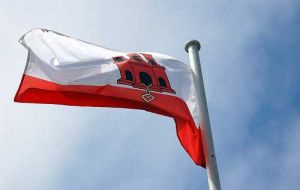MercoPress. South Atlantic News Agency
Opposition Committed to “UN defined Decolonisation”

GSLP/Liberal Opposition will press on for a United Nations defined decolonisation of Gibraltar. That was the message reiterated yesterday by Opposition Leader Joe Bossano on his return from the UN seminar in Grenada.
The United Nations seminar held at Grenada last week debated the constitutional modernisation process which has taken place in a number of British colonies, including Gibraltar, or which is currently still underway. "The view of most of the participants was that modernisation was not synonymous with decolonisation," said an Opposition spokesman. Mr Bossano has said he participated fully in all the discussions in respect of all the territories, given the Opposition view that the case of Gibraltar must be treated applying the same UN criteria which are applied to the other 15 Non-Self Governing territories on the UN list. "It emerged clearly from the debates that other than Western Sahara, where the Frente Polisario has been campaigning for independence, none of the other territories are contemplating the pursuit of this option," said the Opposition. The seminar conclusions reflected this widespread view by acknowledging for the first time the validity of what we have called in Gibraltar the Fourth Option since it was identified in 1992 by the GSLP Government following the first resumed participation at the UN, said the Opposition spokesman. He said that the thrust of Joe Bossano's address was that in evaluating the progress towards the achievement of decolonisation, the UN should identify any shortcomings which prevent the UN from supporting such a Constitution as embracing the attainment of a full measure of self-government. Mr Bossano gave a commitment that in Government the policy would be to pursue with the United Kingdom any shortcomings in the existing Constitution text which are identified by the UN as being required to meet its criteria. Mr Bossano aslo said that he had distanced himself from the UK view that the UN criteria are outdated and antiquated. "The universality of the principle of self-determination as the only legitimate route to attain decolonisation found widespread support amongst the participants. The Committee's approach on this matter was altered so that it no longer unanimously supports the amendment introduced in the Papua New Guinea 2004 seminar." "At this seminar, the words "where there are no disputes on sovereignty" was introduced to qualify the statement that in the process of decolonisation there is no alternative to the principle of self-determination. This was repeated in the Fiji conclusions of last year and quoted by the Spanish representative," said the spokesman. In the conclusions that have gone from this seminar to the Committee of 24, it has been made clear that there was a division within the Committee as to whether the words should be retained or removed and the position restored to what it was in 2002. Mr Bossano said he had challenged those who argued that self-determination did not apply in territories where there was a sovereignty dispute, and invited them to explain in the seminar the basis for their argument. Neither Argentina nor Spain took up the challenge, said the spokesman. "The seminar additionally produced a positive result for Gibraltar in that the reference to continuing negotiations between the UK and Spain in the Brussels context was removed from this year's text. This, of course, does not in itself guarantee that it will not reappear in the Committee of 24's conclusions or in the consensus decision of the 4th Committee in October." The proceedings of the seminar, including the conclusions, are incorporated as a annexe to the Committee of 24's report, for information purposes, when the report goes to the 4th Committee as an official UN document. The opportunity was taken by Mr Bossano to hold private discussions with members of the Committee of 24 at the seminar with representatives of countries that are not traditionally sympathetic to Gibraltar's case because they are not former British colonies. The result of that lobbying was reflected in the participation of those members, said the Opposition. The Opposition said that in response to the attempts of Spain, Argentina and Morocco to shift the argument to the issue of sovereignty disputes, Mr Bossano reminded the delegates of the stand adopted by Indonesia in a previous seminar in which the statement had been made that the deliberations of the seminar should be guided by the principle that the Committee should not be distracted from fulfilling its purpose. "This was that it should be dedicated fully and only to advancing the aspirations and interests of the inhabitants of all the 16 colonies and that discussion of incongruent issues was unacceptable and took the Committee away from its mandated objectives. This view was in fact reflected in the closing statement from the Chairperson of the Committee of 24, who was also chairing the seminar." Gibraltar 'Not a Ministate' Spain has emphasised that Gibraltar is a dependent territory of the UK - a British Overseas Territory - and not a separate state or ministate. The remarks were made in an answer to a parliamentary question in Madrid. Alicia Castro PP had asked about the implications of direct contacts between Gibraltar government and the Moroccan government. Madrid characterised the meetings involving Gibraltar minister Joe Holliday as one of a neighbouring territory. (Gibraltar Chronicle)




Top Comments
Disclaimer & comment rulesCommenting for this story is now closed.
If you have a Facebook account, become a fan and comment on our Facebook Page!